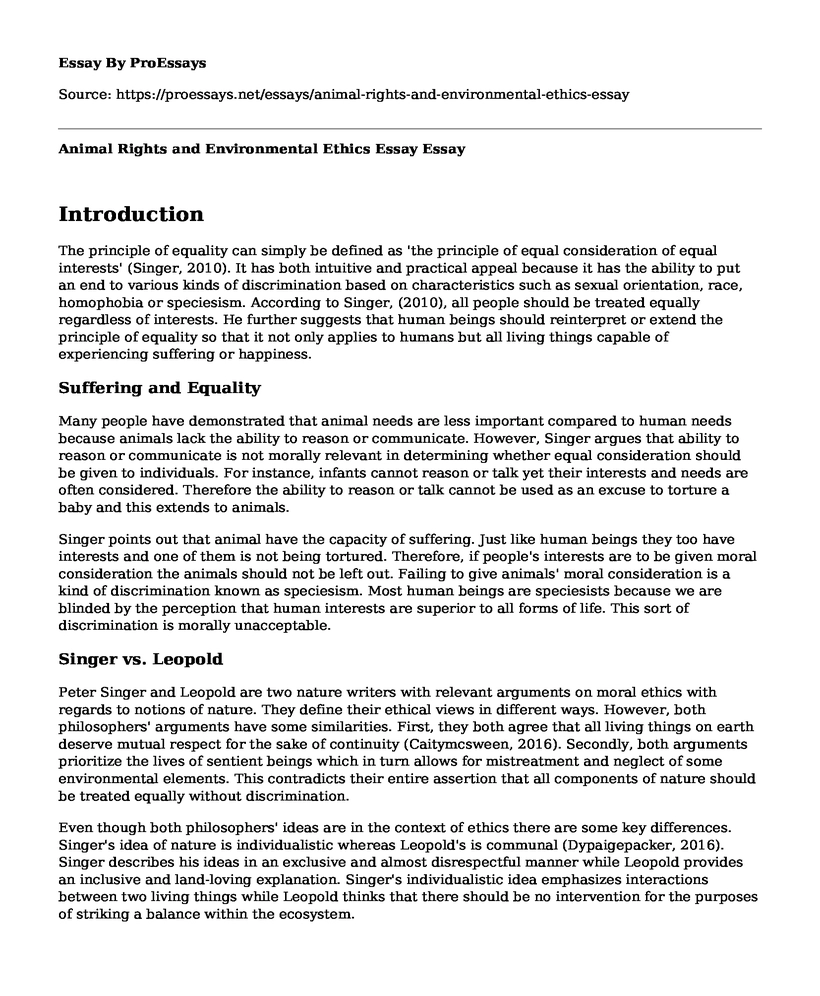Introduction
The principle of equality can simply be defined as 'the principle of equal consideration of equal interests' (Singer, 2010). It has both intuitive and practical appeal because it has the ability to put an end to various kinds of discrimination based on characteristics such as sexual orientation, race, homophobia or speciesism. According to Singer, (2010), all people should be treated equally regardless of interests. He further suggests that human beings should reinterpret or extend the principle of equality so that it not only applies to humans but all living things capable of experiencing suffering or happiness.
Suffering and Equality
Many people have demonstrated that animal needs are less important compared to human needs because animals lack the ability to reason or communicate. However, Singer argues that ability to reason or communicate is not morally relevant in determining whether equal consideration should be given to individuals. For instance, infants cannot reason or talk yet their interests and needs are often considered. Therefore the ability to reason or talk cannot be used as an excuse to torture a baby and this extends to animals.
Singer points out that animal have the capacity of suffering. Just like human beings they too have interests and one of them is not being tortured. Therefore, if people's interests are to be given moral consideration the animals should not be left out. Failing to give animals' moral consideration is a kind of discrimination known as speciesism. Most human beings are speciesists because we are blinded by the perception that human interests are superior to all forms of life. This sort of discrimination is morally unacceptable.
Singer vs. Leopold
Peter Singer and Leopold are two nature writers with relevant arguments on moral ethics with regards to notions of nature. They define their ethical views in different ways. However, both philosophers' arguments have some similarities. First, they both agree that all living things on earth deserve mutual respect for the sake of continuity (Caitymcsween, 2016). Secondly, both arguments prioritize the lives of sentient beings which in turn allows for mistreatment and neglect of some environmental elements. This contradicts their entire assertion that all components of nature should be treated equally without discrimination.
Even though both philosophers' ideas are in the context of ethics there are some key differences. Singer's idea of nature is individualistic whereas Leopold's is communal (Dypaigepacker, 2016). Singer describes his ideas in an exclusive and almost disrespectful manner while Leopold provides an inclusive and land-loving explanation. Singer's individualistic idea emphasizes interactions between two living things while Leopold thinks that there should be no intervention for the purposes of striking a balance within the ecosystem.
References
Singer, P. (2010). 20 All Animals are Equal. Environmental ethics: The big questions, 169.
Dypaigepacker. (2016, April 6). Singer vs. Leopold: Individualistic and Communal Notions of Nature. Retrieved June 21, 2018, from https://dylanature.wordpress.com/2016/04/06/singer-vs-leopold-individualistic-and-communal-notions-of-nature/Caitymcsween. (2016, April 6). Leopold VS Singer- Who's Actually More Ethical? Retrieved June 21, 2018, from https://caitymcsween.wordpress.com/2016/04/06/leopold-vs-singer-whos-actually-more-ethical/
Cite this page
Animal Rights and Environmental Ethics Essay. (2022, Feb 16). Retrieved from https://proessays.net/essays/animal-rights-and-environmental-ethics-essay
If you are the original author of this essay and no longer wish to have it published on the ProEssays website, please click below to request its removal:
- Essay Sample: The United States and the War on Terrorism
- Mass Shootings, Social Contract Theory, and the Sociology of the Media Essay
- Distinction Between the Feminine and the Masculine Paper Example
- Essay Sample on Texas on the Brink: Economic Policies to Reduce Poverty
- Essay on Prejudice: An Unjustified & Unenthusiastic Approach Towards Groups
- U.S. Immigration - Essay Sample
- Controlled Substance Use: Abuse, Addiction & Prescribing Challenges - Essay Sample







